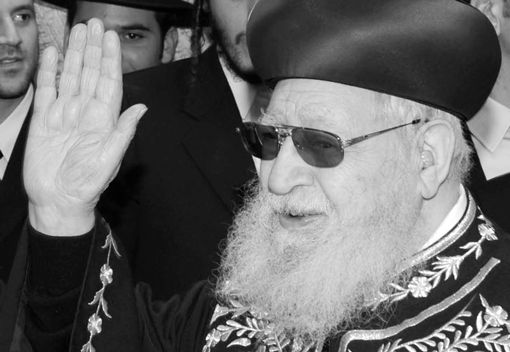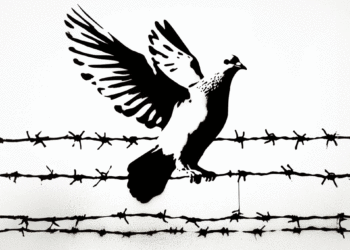Esteemed by many Israelis, Israel’s powerful Sephardic spiritual leader expressed bigoted views and a superficial approach to adjudicating Jewish law
By MOSHE GIT
Rabbi Ovadia Yosef, a former Sephardic chief rabbi of Israel, was the spiritual head of the powerful Sephardic Orthodox party Shas. His lieutenants in the Knesset venerated him and obeyed his directives. As such, for decades, he commanded extraordinary power in Israeli politics; but his halo as a great religious authority extended his influence even further.
Once I heard a 10-year-old boy referring to Rabbi Yosef with awe as “gedol hador” (the greatest rabbi of our generation). No doubt this boy didn’t possess the wherewithal to appraise the greatness of the rabbi. He was just regurgitating what he had heard from others in his environs. Such was the case, I believe, with most of Rabbi Yosef’s admirers — the great majority of them were just following the herd.

-
An estimated crowd of 800,000 Israelis clogged the streets of Jerusalem for the funeral of Rabbi Ovadia Yosef, who died Oct. 7. (Photo: Amos Ben Gershom/GPO/Flash 90)
When Yosef passed away recently, at the age of 93, Israel seemed to be in an overwhelming state of grief. His funeral was perhaps the greatest in Israel’s history. Accolades for his personality and greatness filled the news media
His followers used the unprecedented number of people who joined his funeral, where due to the pandemonium over 50 required medical attention, as evidence of his greatness — unconsciously reversing cause and effect. This reminded me of Stalin (who was worshipped as “the sun of the nations”) and his funeral, where sobbing millions followed his coffin, many of whom were trampled to death in the chaos of mourning. I wasn’t enchanted by Rav Yosef. Our sages said that a person may acquire his world in an instant and may lose it in an instant; and I think Yosef lost his world in an instant. He directed many derogatory words at individual and groups of Jews, as well as black people and gentiles (“they were created to serve the Jews”).
But while all of this is deplorable, I cannot forgive the one utterance of his directed at those who perished in the Holocaust. Yosef said that the victims of the Holocaust had it coming to them because they possessed souls of sinners; i.e., that the more than a million Jewish children, plus pious rabbis, yeshiva students and simple believers all deserved to die.
That means that my 10-year-old cousin, Yisrael Yitzhak — whose only remaining personal artifact is a letter that he wrote to my father, in which he described his school work and expressed his desire to be reunited with him in the Land of Israel — was a sinner (along with his baby sister, his three other siblings, and his pious parents), and therefore they all deserved to perish.
Our sages were aware of the possibility that rabbinic scholars could nevertheless suffer from lack of judgment. They said that such scholars were worse than a neveila (a despicable corpse of an animal). This reflects my view of Rabbi Yosef.
Also, I failed to recognize his ostensible greatness in halacha (rabbinic law). I browsed through his signature responsa book, Yabia Omer. His modus operandi there was to go over several past approaches to the question at issue; but when the most interesting step arrived, i.e., providing the long-awaited answer, he tersely and arbitrarily chose one of the approaches he had described, without providing the reason for the preference. Thus, I couldn’t discern any ingenuity there. Some of his rulings seemed superficial.
For example, he based his decision to recognize Ethiopian immigrants as Jews on earlier sources, such as the Radbaz (Rabbi David Ben Zimrah) of the 15th century. But that rabbi based his opinion mostly on the stories of a 9th century self-proclaimed traveler, Eldad Hadani, with regard to the latter’s journey to Ethiopia and to his statements with respect to the origin of the Ethiopian Jews. Without exception, scholars hold that Hadani’s accounts were a fantasy and unreliable. (For example, Hadani reported that he had crossed the Sambatyon, a legendary river that could be crossed only on Saturdays, when it rested, since during weekdays its current was wild and stormy.)
During recent weeks, the glorifications of Rabbi Yosef have been balanced by more sober appraisals of his legacy. Press accounts have noted the Shas Party’s association with crime. Many of Shas’ top lieutenants spent time in jail on corruption charges, including Shas architect and former Israeli Cabinet minister Arie Deri.
It seems that Israel has begun recuperating from the Rabbi Yosef hysteria.
***
Moshe Git lives in Minnetonka.
(American Jewish World, 12.20.13)





















The author of this article shows his own prejudice in repeating hearsay from the secular media as given, whether it was said as claimed or taken out of context.
I would dare to suggest that the author has never actually heard any of the comments he applies against the esteemed Rav.
Such is sadly an inherent trait common amongst many of our fair skinned brethren.
One is also bound to ask, what is the Kabbalistic qualification of the author is when he appears to be engaging in a battle against the esteemed Rav’s supposed comments which are based on Kaballa.
A far better appraisal of the Rav are the 3 works of Rabbi Jachter which the author is recommended to get acquainted with.
http://www.tabc.org/kol-torah/article/index.aspx?pageaction=ViewSinglePublic&LinkID=1009&ModuleID=43&StartDate=12/14/2013&NEWSPID=1
http://www.tabc.org/kol-torah/article/index.aspx?pageaction=ViewSinglePublic&LinkID=1019&ModuleID=43&StartDate=12/21/2013
http://www.tabc.org/kol-torah/article/index.aspx?pageaction=ViewSinglePublic&LinkID=1042&ModuleID=43&StartDate=12/28/2013&NEWSPID=1